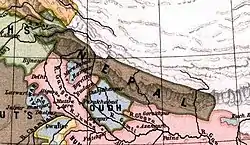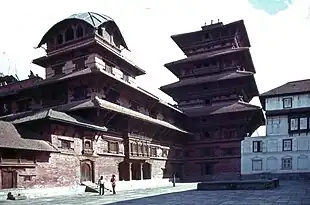The following is a timeline of the history of the city of Kathmandu, Nepal.
Prior to 20th century
| History of Nepal |
|---|
 |
|
|
- 1567 BCE – Kirant rule started
- 1000 BCE – Swayambhunath shrine built (approximate date).[1]
- 723 CE – Kathmandu founded by Raja Gunakamedeva.[2]
- 1339 – Samasuddhin attacks Nepal and loots lot of jewels
- 1480 – Kathmandu becomes independent.[1]
- 1596 – Temple of Kathmandu built.[1]
- 1690 – Maju Deval built.[3]
- 1768 – Battle of Kathmandu; city taken by Gurkha forces of Prithvi Narayan Shah.[4]
- 1832 – Dharahara Tower built by Bhimsen Thapa.[3]
- 1846 – Kot massacre.[1]
- 1886 – Residence of royal family relocated from Hanuman Dhoka (Basantapur Palace) to Narayanhity Palace (now a museum).
20th century
- 1901 – Gorkhapatra newspaper begins publication.[5]
- 1920
- Garden of Dreams built for Kaiser Shamsher Jang Bahadur Rana.
- Population: 108,805 metro.[1]
- 1934 – 1934 Nepal–Bihar earthquake.[1]
- 1954 – Nepali Hindi Daily newspaper begins publication.[5]
- 1956 – Central Zoo opens.[6]
- 1959 – Tribhuvan University founded in nearby Kirtipur.[7]
- 1961
- 1967 – National Museum of Nepal active.
- 1970 – Narayanhity Palace rebuilt.

Hanuman Dhoka-Nasal Chowk 1976
- 1975
- 24 February: Coronation of king Birendra.[9]
- Natural History Museum of Nepal established.
- 1979 – Kathmandu Valley UNESCO World Heritage Site established.[10]
- 1981 – Population: 235,160.[11]
- 1983 – Daily News English-language newspaper begins publication.[5]
- 1992
- April: Political demonstration; crackdown.[12]
- Nepal Stock Exchange established.
- 1994 – Center for Nepal Environmental and Educational Development established.[13]
21st century
- 2001
- 1 June: Nepalese royal massacre.
- Population: 671,846 city;[14] in 1,081,845 Kathmandu District.[5]
- 2007
- United Nations Mission in Nepal headquartered in Baneshwor.[15]
- September: Bombing.[4]
- 2010 – September: 12th General Convention of the Nepali Congress held in Kathmandu.
- 2011 – Population: 1,003,285;[16] 1,744,240 in Kathmandu District.
- 2015 – 25 April: The 7.8 Mw Ghorka earthquake affected the country with a maximum Mercalli intensity of IX (Violent). Almost 9,000 people were killed in the region.
See also
References
- 1 2 3 4 5 6 Leon E. Seltzer, ed. (1952), "Katmandu", Columbia Lippincott Gazetteer of the World, New York: Columbia University Press, p. 920, OL 6112221M
- ↑ Balfour 1885.
- 1 2 "Nepal's Landmarks, Before and After the Earthquake", New York Times, 25 April 2015
- 1 2 BBC News (17 February 2011). "Nepal Profile: Timeline". BBC News. Retrieved 30 April 2015.
- 1 2 3 4 "Nepal". Far East and Australasia 2003. Regional Surveys of the World. Europa Publications. 2002. p. 923+. ISBN 978-1-85743-133-9.
- ↑ Vernon N. Kisling, ed. (2000). Zoo and Aquarium History. USA: CRC Press. ISBN 978-1-4200-3924-5.
- ↑ John S. Bowman, ed. (2000). "Nepal". Columbia Chronologies of Asian History and Culture. Columbia University Press. p. 393+. ISBN 978-0-231-50004-3.
- ↑ "Population of capital cities and cities of 100,000 and more inhabitants". Demographic Yearbook 1965. New York: Statistical Office of the United Nations. 1966.
- ↑ Ian Preston, ed. (2001). "Nepal". Political Chronology of Central, South and East Asia. Political Chronologies of the World. Europa Publications. p. 201+. ISBN 978-1-135-35680-4.
- ↑ "Kathmandu Valley-Unesco World Heritage site". World Heritage Centre. United Nations Educational, Scientific and Cultural Organization. Retrieved 30 April 2015.
- ↑ United Nations Department of Economic and Social Affairs, Statistical Office (1987). "Population of capital cities and cities of 100,000 and more inhabitants". 1985 Demographic Yearbook. New York. pp. 247–289.
{{cite book}}: CS1 maint: location missing publisher (link) - ↑ John Whelpton (2005). "Key Events". A History of Nepal. Cambridge University Press. ISBN 978-0-521-80470-7.
- ↑ "Garden Search: Nepal". London: Botanic Gardens Conservation International. Retrieved 30 April 2015.
- ↑ "Introduction". Kathmandu Metropolitan City Office. Archived from the original on 23 June 2012. Retrieved 30 April 2015.
- ↑ "Organizations". International Relations and Security Network. Switzerland: Eidgenössische Technische Hochschule Zürich. Retrieved 30 April 2015.
- ↑ "Population of Capital Cities and Cities of 100,000 or More Inhabitants". Demographic Yearbook 2013. United Nations Statistics Division.
This article incorporates information from the Portuguese Wikipedia.
Bibliography
- Edward Balfour (1885), "Khatmandu", Cyclopaedia of India (3rd ed.), London: B. Quaritch, hdl:2027/mdp.39015068611014 – via HathiTrust
- Schellinger and Salkin, ed. (1996). "Kathmandu". International Dictionary of Historic Places: Asia and Oceania. UK: Routledge. p. 464+. ISBN 9781884964046.
- Urmi Sengupta (2011). "The divided city?: squatters' struggle for urban space in Kathmandu". In Jonathan Shapiro Anjaria and Colin McFarlane (ed.). Urban Navigations: Politics, Space and the City in South Asia. Routledge. ISBN 978-1-136-19742-0.
External links
Wikimedia Commons has media related to Kathmandu.
- Map of Kathmandu, 1985
- "(Maps of Kathmandu)". 2015. Archived from the original on 2016-12-03. Retrieved 2015-05-19 – via United Nations Office for the Coordination of Humanitarian Affairs.
- Europeana. Items related to Kathmandu, various dates.
- Digital Public Library of America. Items related to Kathmandu, various dates
This article is issued from Wikipedia. The text is licensed under Creative Commons - Attribution - Sharealike. Additional terms may apply for the media files.

